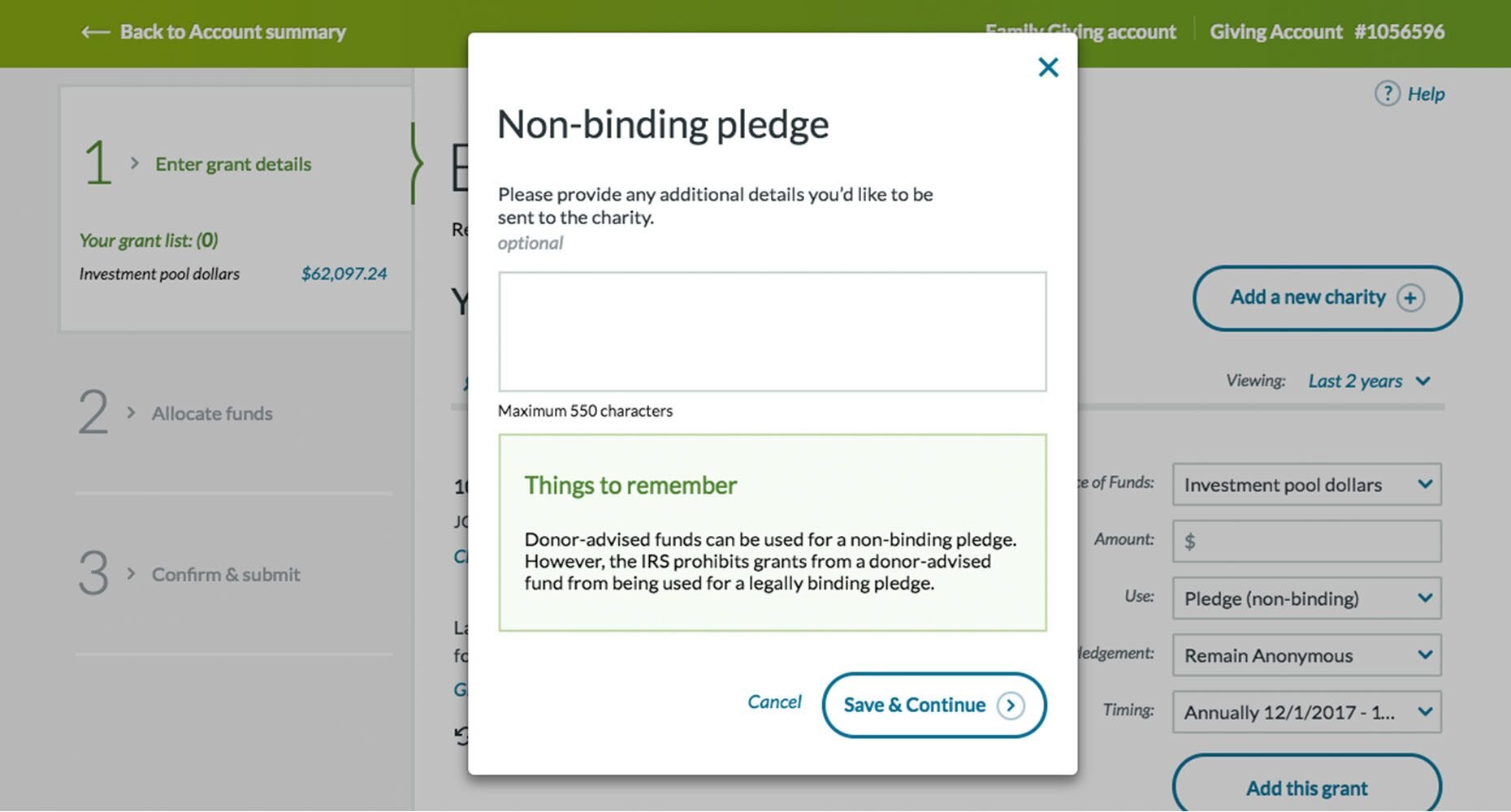Can I make a pledge with a donor-advised fund?
Our Fidelity Charitable experts answer your charitable giving questions.

Q: In honor of our 25th reunion, my former classmates are organizing a class gift to fund financial aid scholarships at our university. They are asking for a 5-year pledge of support, and I’d like to contribute. Can I use my donor-advised fund?
A: What a wonderful opportunity to make a difference for the next generation of students at your alma mater! The good news is that, while a donor-advised fund grant cannot be used to fulfill your legally binding pledge, you can still support your reunion class gift with your Giving Account, said Stephanie Young, a leader on Fidelity Charitable’s grants team. Young and the other members of the grants team work with donors and nonprofits to ensure that more than one million grant recommendations annually are appropriately reviewed and that the funds are distributed for charitable purposes.
Why a pledge is off the table—and what to do instead
The Internal Revenue Code prohibits donor-advised fund grants from providing a “more than incidental benefit” to donors or related parties, which can trigger penalty taxes on donors and others, Young explained. Fidelity Charitable does not make grants that would relieve a donor's (or another party's) financial obligation, such as a legally enforceable pledge. But if you haven't made a legally binding commitment, you can certainly recommend a grant in support of your non-binding “pledge.” Simply select the category “Pledge (non-binding)” from the menu of options when you are recommending the grant, Young said. You will have the option to describe the purpose of the grant—in this case, to support your class reunion’s scholarship project.
It’s also a good idea to keep verbal communications vague; don’t promise a particular amount, as in some states, a verbal commitment is considered binding. If you or the nonprofits you support have questions about what you can or cannot do with a donor-advised fund, the Fidelity Charitable service team is happy to help.

Q: But what if my university or the chair of my class gifts committee wants something in writing?
A: In that case, Young said, you can supply them with a non-binding letter of intent. This way, you can indicate your plans to recommend a grant over the next five years without making a formal legal commitment.
Even if the nonprofit doesn’t specifically request something in writing, it’s always a nice idea to tell them of your intentions, Young added. Knowing how much donors intend to contribute in the future, for what purpose and for how long helps nonprofits budget appropriately.
Here is sample language that can be used any time this issue comes up:
SAMPLE LANGUAGE FOR A NON-BINDING LETTER OF INTENT
I/We intend to recommend a grant from the [name of donor-advised fund], a donor-advised fund, in the amount of $_________ [during the year 20__ /annually for the years 20__-20__]. Grant recommendations are subject to the approval of [name of public charity sponsoring the donor-advised fund]. This expression of intent does not create a legally enforceable obligation.
Make supporting a non-binding pledge easier by setting up recurring grants and contributions
Sometimes, Young advised, if you plan to support a charity or project over a period of years, it may be helpful to take advantage of some of the other features of a Fidelity Charitable donor-advised fund. You can set up a recurring grant recommendation so the funds get distributed to your alma mater on a regular schedule. You can choose whether this is monthly, quarterly, twice a year or on an annual basis.

Similarly, you can set up recurring contributions to your donor-advised fund from a checking or brokerage account. This is an easy way to spread the funding of your charitable contributions over time.
Supporting education-related charities, including universities, is one of the most popular ways that Fidelity Charitable donors make a difference, Young said. But taking these steps will ensure that no matter what the cause, you can turn to your donor-advised fund when you want to say “yes” to a charity’s request for a pledge of support.
Want more info before you open a Giving Account?
Sign up to receive occasional news, information and tips that support smarter philanthropic impact through a donor-advised fund.
How Fidelity Charitable can help
Since 1991, we have been a leader in charitable planning and giving solutions, helping donors like you support their favorite charities in smart ways.
Or call us at 800-262-6039



